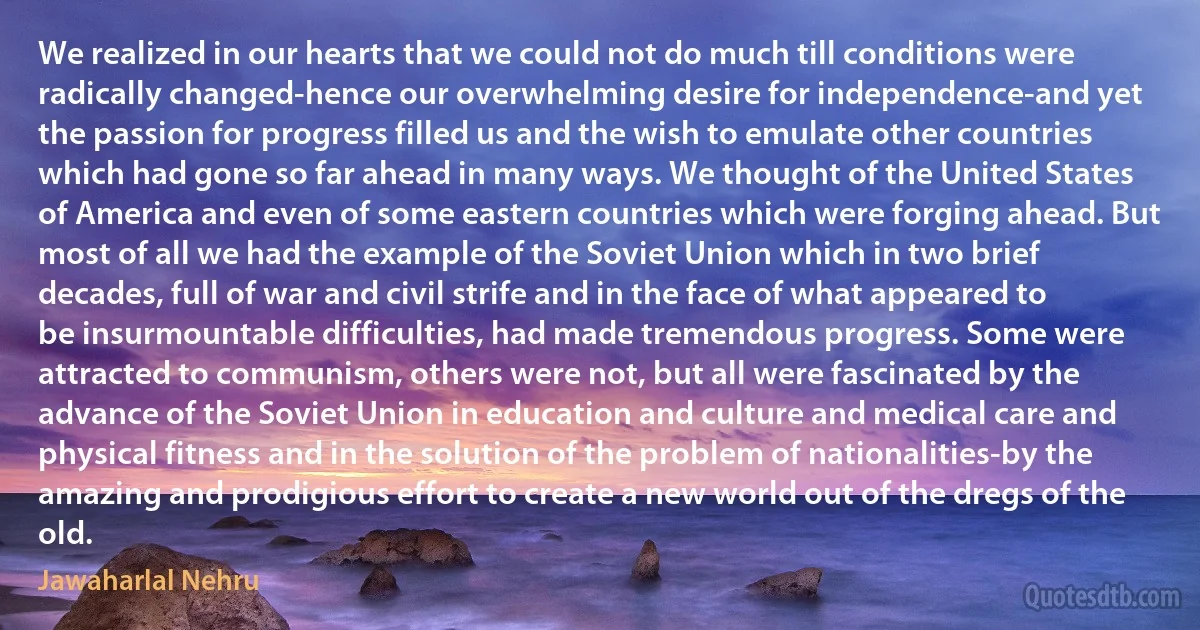
We realized in our hearts that we could not do much till conditions were radically changed-hence our overwhelming desire for independence-and yet the passion for progress filled us and the wish to emulate other countries which had gone so far ahead in many ways. We thought of the United States of America and even of some eastern countries which were forging ahead. But most of all we had the example of the Soviet Union which in two brief decades, full of war and civil strife and in the face of what appeared to be insurmountable difficulties, had made tremendous progress. Some were attracted to communism, others were not, but all were fascinated by the advance of the Soviet Union in education and culture and medical care and physical fitness and in the solution of the problem of nationalities-by the amazing and prodigious effort to create a new world out of the dregs of the old.
Jawaharlal NehruRelated topics
advance care desire difficulties education effort example face far fitness full passion problem strife thought till war wish world yet dregs others hearts States waysRelated quotes
There science is dealing with physical facts, in art we are dealing with psychic effects. With this I come to my first statement: 'The source of art – that is, where it comes from – is the discrepancy between physical fact and psychic effect'. That's what I'm talking about. When I want to speak about why I am doing the same thing now, which is squares, for – how long? – 19 years. Because there is no final solution in any visual formulation. Although this may be just a belief on my part, I have some assurances that that is not the most stupid thing to do, through Cezanne whom I consider as one of the greatest painters. From Cézanne we have, so the historians tell us – 250 paintings of Mont St. Victoire. But we know that Cézanne has left in the fields often more than he took home because he was disappointed with his work. So we may conclude he did many more than 250 of the same problem.

Josef Albers
And for us in this country to think of having, for example, a dictatorship-a popular form of government in many countries to-day-would, on our part, be an act of consummate cowardice, an act of surrender, of throwing in our hands, a confession that we were unable to govern ourselves...In this country we do not want what I call the "get-rich-quick" mind. Speed and efficiency are very good things, and they are, perhaps, the idols of this generation. But they do not necessarily go together. Acceleration, as I have often said, is not a synonym for civilisation. It is quite true the State coach of this country may be going through heavy ground, the wheels may be creaking; but are you quite sure that the wheels of the State coach are not creaking to-day in Moscow, in Berlin, in Vienna? Are you quite certain that they are not creaking even in the United States of America?

Stanley Baldwin
We have entered a time of global transition marked by uniquely contradictory trends. Regional and continental associations of States are evolving ways to deepen cooperation and ease some of the contentious characteristics of sovereign and nationalistic rivalries. National boundaries are blurred by advanced communications and global commerce, and by the decisions of States to yield some sovereign prerogatives to larger, common political associations. At the same time, however, fierce new assertions of nationalism and sovereignty spring up, and the cohesion of States is threatened by brutal ethnic, religious, social, cultural or linguistic strife. Social peace is challenged on the one hand by new assertions of discrimination and exclusion and, on the other, by acts of terrorism seeking to undermine evolution and change through democratic means.

Boutros Boutros-Ghali
This trendy, new crowd, which likes to do everything with committees, really believes that all it takes to make anything legal and OK is a majority. I guess they call that democracy. When the majority is what it has become in the United States today, a better name is mobocracy. But really, it's much worse than mob rule. It is rule by a self-appointed elite of utterly evil and destructive people who have in their hands the tools for controlling and guiding the mob. They're pretty cocky now -- so cocky, in fact, that they're making statements of the sort I've quoted today. They're cocky because they believe that no one can take away from them their tools for controlling the mob, and that as time passes and America becomes darker and more degenerate, their grip on the mob will only become firmer. Our job is to prove them wrong. It's a big job, and we'd better get started.

William Luther Pierce
Dear Sir, - I have truly, I must say, written three times, and now hesitate; for did I know your son's works, or, as you say, his gifted merits yet even then I would rather advise you to think well, and not be carried away by the admiration which any friendly hopes (which ardent friends to early talent) may assume: they know not the difficulties or the necessities of the culture of the Fine Arts generally speaking. In regard to yourself, it is you alone can judge how far you are inclined to support him during perhaps a long period of expense; and particularly if you look towards tuition, the more so; for it cannot insure success (however much it may facilitate practice), and therefore it behooves you to weigh well the means in your power before you embark in a profession which requires more care, assiduity, and perseverance than any person can guarantee.

J. M. W. Turner
